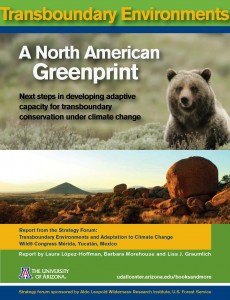Wherever political boundaries traverse ecosystems, the conservation of biodiversity and management of ecosystems is more complex and difficult. In areas with such borders, the flow of information tends to be slower, administrative regimes are more fractured, decisions are more delayed—often executed with little or no coherence—and responsibilities, masked. Furthermore, as a changing climate alters species distributions and ecosystem processes—for example, those that straddle the U.S.–Mexico and U.S.–Canada borders in North America—the inherent difficulties of transboundary conservation and management also are likely to limit the adaptability of human and natural systems to such changes.
The 9th World Wilderness Conference, WILD9, held in November 2009 in Mérida, Yucatán,Mexico, provided a unique opportunity in which to explore the implications of climate change in shared environments of North America, as well as in other parts of the world. With funding from the U.S. Forest Service Aldo Leopold Wilderness Research Institute, organizers from the University of Arizona and elsewhere convened a workshop, “Strategy Forum on Transboundary Environments and Adaptation to Climate Change,” to assess the state of North American transboundary conservation efforts and to identify critical needs for building transboundary initiatives that are adaptive to a changing climate.
The purpose of the workshop was to develop a brief list of specific, targeted, and prioritizedactions that could be undertaken in the ensuing three‐to‐five years to strengthen transboundary conservation programs, policies, and institutions in North America. This report summarizes the discussion and conclusions from that gathering.
 Read the full report from the Strategy Forum on Transboundary Environments and Adaptation to Climate Change (Convened at WILD9, the 9th World Wilderness Congress) – A North American Greenprint: Next Steps in Developing Adaptive Capacity for Transboundary Conservation under Climate Change (2MB PDF Download); Prepared by Laura López-Hoffman, Barbara Morehouse and Lisa J. Graumlich and supported by a grant from the U.S. Forest Service Aldo Leopold Wilderness Research Institute. (Published by the Udall Center for Studies in Public Policy, The University of Arizona, udallcenter.arizona.edu, March 2011).
Read the full report from the Strategy Forum on Transboundary Environments and Adaptation to Climate Change (Convened at WILD9, the 9th World Wilderness Congress) – A North American Greenprint: Next Steps in Developing Adaptive Capacity for Transboundary Conservation under Climate Change (2MB PDF Download); Prepared by Laura López-Hoffman, Barbara Morehouse and Lisa J. Graumlich and supported by a grant from the U.S. Forest Service Aldo Leopold Wilderness Research Institute. (Published by the Udall Center for Studies in Public Policy, The University of Arizona, udallcenter.arizona.edu, March 2011).
